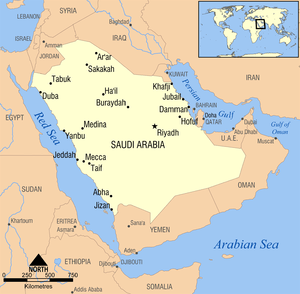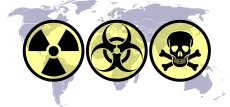Saudi Arabia and weapons of mass destruction
Saudi Arabia has not officially maintained and possessed weapons of mass destruction (WMD). In 1972 Saudi Arabia signed and approved the convention on the prohibition of the development, production and stockpiling of biological (bacteriological) and toxin weapons.[1][2][3] Nevertheless, Saudi Arabia has made steps towards a nuclear program[4][5] and according to some observations, they can be used to develop nuclear weapons.[6] According to some reports, Riyadh has an alleged deal with Pakistan regarding nuclear weapons projects.[7] There are claims that Saudi Arabia has used chemical and biological weapons in Yemen.[8][9]

| Weapons of mass destruction |
|---|
 |
| By type |
| By country |
|
| Proliferation |
| Treaties |
|
In 2018 Crown Prince Mohammad bin Salman confirmed on 60 Minutes that Saudi Arabia would develop nuclear weapons if Iran successfully detonated one, causing widespread distrust of the Saudi Arabian nuclear program.[10][11]
Background
Saudi Arabia, officially is a non-nuclear-weapon state party to the Treaty on the Non-Proliferation of Nuclear Weapons,[12] and it has also an agreement with International Atomic Energy Agency.[13] Riyadh has been accused of following nuclear,[7][6] despite being a follower of IAEA,[14] NPT[15] and OPCW.[16]
Nuclear foundations
Riyadh officials had travels to France and Russia and signed several transactions, among establishment of atomic foundations in Saudi Arabia. Riyadh is pursuing its open negotiations about establishment of atomic foundations in front of media.[17] Despite that, it has been secretly looking for the establishment of a scientific atomic center by the co-operation of Pakistan,[6][17] which can be associated with purchasing nuclear weapons from Pakistan.[18]
Riyadh declared that it was following a nuclear power program without co-operation of other countries, and according to a royal command in April 2010: "The development of atomic energy is essential to meet the Kingdom's growing requirements for energy to generate electricity, produce desalinated water and reduce reliance on depleting hydrocarbon resources." KA-CARE has been set up in the capital of Saudi Arabia in order to progress this agenda which is considered as an alternative to oil, and also to be the proper agency for the purpose of treaties on nuclear energy signed by Saudi kingdom. Besides, it appointed the Finland- and Swiss-based Poyry consultancy company in order to assist define "high-level strategy in the area of nuclear and renewable energy applications" with desalination.[19]
As well as this, the (South) Korea Atomic Energy Research Institute has signed an agreement with KA-CARE in March 2015 which is led to evaluate its potential to build two or more than two South Korean SMART reactors. Furthermore, in March/August 2017, the Saudi Arabia Geological Survey signed an agreement to a Chinese nuclear company (CNNC), and it was associated with co-operation on uranium exploration. CNNC mentioned that this will explore 9 potential areas for the resources of uranium in Saudi Arabia.[19]
Nuclear weapons
The BBC reported using multiple sources that Saudi Arabia has funded nuclear weapons development in Pakistan,[12][20] and the Saudi government believes that it is able to gain nuclear weapons at will.[21] A senior NATO decision maker did mention that he personally viewed intelligence reports indicating that nuclear weapons which have been manufactured in Pakistan by the request of Riyadh, are ready for delivery.[12] Saudi Arabia's foreign minister neither rejected nor confirmed the possibility of purchasing nuclear weapons.[18] Furthermore, Saudi royalty and other high-ranking officials have explicitly mentioned warnings in regards to their intention to obtain nuclear weapons if Iran were to come in possession of such weaponry.[12][22][23][24] On 15 March 2018 Saudi defence minister and heir to the throne Prince Mohammad bin Salman made such a statement on the CBS 60 Minutes programme.[25]
In 2019 the House Committee on Oversight and Reform in the United States reported that President Donald Trump planned to provide nuclear technology to Saudi Arabia in violation of the Atomic Energy Act.[26] The reactors would be built by the company IP3 International, while negotiations were conducted by Jared Kushner and Energy Secretary Rick Perry.[27] The report caused widespread condemnation from both Republican and Democratic lawmakers in both houses of Congress due in part to the recent assassination of Jamal Khashoggi and the conduct of the Saudi Arabian-led intervention in Yemen.[28] In the Senate Ed Markey and Marco Rubio introduced a bill, the Saudi Nuclear Proliferation Act, to block the deal.[10] Concerns were also directed about whether the deal would entail access to uranium enrichment technology.[27] In response U.S. Deputy Energy Secretary Dan Brouillette claimed that Saudi Arabia would sign a Section 123 agreement restricting how Saudi Arabia could use nuclear technology.[29]
Saudi Arabia has also shortlisted firms in Russia, China, France, and South Korea as sources of nuclear power.[27]
Nuclear weapons delivery
According to the BBC, Saudi Arabian attempts to acquire ballistic missiles capable of fielding a nuclear warhead go back several decades.[30] The Royal Saudi Strategic Missile Force possesses DF-3A (NATO: CSS-2) as a Chinese missile which is used in nuclear weapons delivery.[31] In fact, it is regarded as a Chinese liquid-fueled, single-stage, nuclear medium-range ballistic missile. Saudi Arabia bought several dozen (between 36 and 60) of this kind of missile from China in 1987.[32] Riyadh displayed them in a parade 2014, the first public viewing of the weapons.[33]
 Participation in the Biological Weapons Convention
| |||
| Signed | 10 April 1972 | ||
|---|---|---|---|
| Location | London, Moscow, and Washington, D.C. | ||
| Effective | 26 March 1975 | ||
| Condition | Ratification by 22 states | ||
| Signatories | 109 | ||
| Parties | 180 as of January 2018 (complete list) | ||
Chemical and biological weapons
Officially, Saudi Arabia is regarded as a party to both the Biological and Toxin Weapons Convention (BTWC), and also the Chemical Weapons Convention (CWC).[13]
Sunjeev Bery, Amnesty International's advocacy director for the Middle East and North Africa stated that “The United States must not provide or sell white phosphorus munitions to Saudi Arabia or any other military that would use them in the Yemen conflict,” On other hands some images and videos posted to social media shows that Saudi Arabia appears to be using U.S.-supplied white phosphorus munitions in its war in Yemen. It made concern human rights groups.[34]
References
- Convention on the Prohibition of the Development, Production and Stockpiling of Bacteriological (Biological) and Toxin Weapons and on their Destruction state.gov Retrieved 22 January 2018
- Disease as a Weapon: Assessing the international methods of ensuring biological weapons nonproliferation portfolio.du.edu Retrieved 13 January 2018
- Status of the Convention www.opbw.org Retrieved 13 January 2018
- KSA takes first step towards nuclear plant tender: sources reuters.com Retrieved 16 January 2018
- Nuclear Power in Saudi Arabia world-nuclear.org Retrieved 16 January 2018
- "Pakistan, Saudi Arabia in secret nuke pact Islamabad trades weapons technology for oil". globalsecurity.org. 24 January 2018.
- Russell, op. cit, p.72.
- "Syrian forces uncover Saudi chemical weapons agents in Aleppo". presstv.com. 22 January 2018.
- "Army Spokesman: Saudi Forces Use Chemical, Biological Weapons in Yemen's Ma'rib". en.farsnews.com. 22 January 2018.
- "U.S. lawmakers press for oversight of any Saudi nuclear deal". Reuters. 2019-02-28. Retrieved 2019-03-22.
- March 15, CBS News; 2018; Am, 4:32. "Saudi crown prince: If Iran develops nuclear bomb, so will we". www.cbsnews.com. Retrieved 2019-03-22.CS1 maint: numeric names: authors list (link)
- "Saudi nuclear weapons 'on order' from Pakistan". bbc.com. 17 January 2018.
- "SAUDI ARABIA". nti.org. 17 January 2018.
- List of Member States News iaea.org Retrieved 27 January 2018
- Treaty on the Non-Proliferation of Nuclear Weapons disarmament.un.org Retrieved 27 January 2018
- 3. Convention on the Prohibition of the Development, Production, Stockpiling and Use of Chemical Weapons and on their Destruction treaties.un.org Retrieved 27 January 2018
- "Disclosure of Saudi's secret nuclear program with Pakistan". tasnimnews.com. 17 January 2018.
- "The Mystery of Buying Nuclear Weapons from Pakistan by KSA". yjc.ir. 18 January 2018.
- "Nuclear Power in Saudi Arabia". world-nuclear.org. 7 February 2018.
- Saudi Arabia banks on Pakistan for nukes: BBC report livemint.com 17 January 2018
- "Saudi Arabia orders nuclear weapons to Pakistan". bbc.com. 17 January 2018.
- Pakistan rejects report about Saudi support for N-plan dawn.com Retrieved 18 January 2018
- Iran’s Next President and the Third Nuclear Strategy al-monitor.com Retrieved 18 January 2018
- "Saudi Arabia orders nuclear weapons to Pakistan". irna.ir. 18 January 2018.
- "Saudi Arabia pledges to create a nuclear bomb if Iran does". BBC News. 15 March 2018. Retrieved 15 March 2018.
- Committee on Oversight and Reform. Whistleblowers raise grave concerns with Trump administration's efforts to transfer sensitive nuclear technology to Saudi Arabia : interim staff report. OCLC 1088438840.
- Johnson, Keith. "Who's Afraid of Saudi Nukes?". Foreign Policy. Retrieved 2019-03-22.
- "U.S. Senate proposal would block Saudi path to atomic weapon in..." Reuters. 2019-02-13. Retrieved 2019-03-22.
- Reid, David (2019-02-16). "Brouillette: US won't give Saudi Arabia key to nuclear weapon building". www.cnbc.com. Retrieved 2019-03-22.
- Urban, Mark (2013-11-06). "Saudi nuclear weapons 'on order' from Pakistan". BBC News. Retrieved 2018-03-13.
- Cordesman, op. cit, p.10
- DF-3A / CSS-2 fas.org Retrieved 8 February 2018
- "Saudi Arabia unveils part of strategic missile force — a deterrent move against Iran?". Defense Update. 2 May 2014. Retrieved 9 May 2014.
- Gibbons-Neff, Thomas. "Saudi Arabia appears to be using U.S.-supplied white phosphorus in its war in Yemen". washingtonpost. Retrieved 19 September 2016.
External links
| Classification |
|---|
- Nuclear Power in Saudi Arabia, World Nuclear Association
- DF-3A / CSS-2, China sold several dozen outmoded DF-3 missiles to Saudi Arabia
- Campaigners warns of “toxic” UK arms deals with Saudi Arabia
- Saada's Governor: Saudi Arabia is Experimenting Toxic Weapons in Yemen's Saada